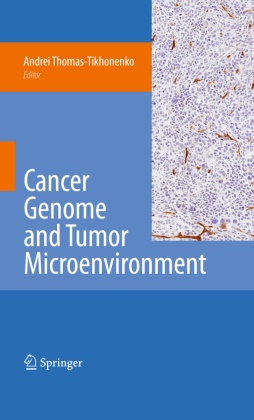Partager
Fr. 239.00
Andre Thomas-Tikhonenko, Andrei Thomas-Tikhonenko
Cancer Genome and Tumor Microenvironment
Anglais · Livre de poche
Expédition généralement dans un délai de 6 à 7 semaines
Description
Oncogenes and tumor suppressor genes had been traditionally studied in the context of cell proliferation, differentiation, senescence, and survival, four relatively cell-autonomous processes. Consequently, in the late '80s-early '90s, neoplastic growth was described largely as an imbalance between net cell accumulation and loss, brought about through mutations in cancer genes. In the last ten years, a more holistic understanding of cancer has slowly emerged, stressing the importance of interactions between neoplastic and various stromal components: extracellular matrix, basement membranes, fibroblasts, endothelial cells of blood and lymphatic vessels, tumor-infiltrating lymphocytes, etc. The commonly held view is that changes in tumor microenvironment are "soft-wired", i.e., epigenetic in nature and often reversible. Yet, there exists a large body of evidence suggesting that well-known mutations in cancer genes profoundly affect tumor milieu. In fact, these non-cell-autonomous changes might be one of the primary reasons such mutations are preserved in late-stage tumors.
Table des matières
Opening Remarks.- Hardwiring Tumor Progression.- Breaking Away: Epithelial-Mesenchymal Transition.- PI3K/AKT Pathway and the Epithelial-Mesenchymal Transition.- Loss of Cadherin-Catenin Adhesion System in Invasive Cancer Cells.- Rho GTPases in Regulation of Cancer Cell Motility, Invasion, and Microenvironment.- Merlin/NF2 Tumor Suppressor and Ezrin-Radixin-Moesin (ERM) Proteins in Cancer Development and Progression.- Coming up for Air: Hypoxia and Angiogenesis.- von Hippel-Lindau Tumor Suppressor, Hypoxia-Inducible Factor-1, and Tumor Vascularization.- RAS Oncogenes and Tumor-Vascular Interface.- Myc and Control of Tumor Neovascularization.- p53 and Angiogenesis.- Ink4a Locus: Beyond Cell Cycle.- Gaining New Ground: Metastasis and Stromal Cell Interactions.- Nm23 as a Metastasis Inhibitor.- HGF/c-MET Signaling in Advanced Cancers.- Contribution of ADAMs and ADAMTSs to Tumor Expansion and Metastasis.- Stromal Cells and Tumor Milieu: PDGF et al..- TGF-? Signaling Alterations in Neoplastic and Stromal Cells.- Getting Attention: Immune Recognition and Inflammation.- Genetic Instability and Chronic Inflammation in Gastrointestinal Cancers.- Immunoglobulin Gene Rearrangements, Oncogenic Translocations, B-Cell Receptor Signaling, and B Lymphomagenesis.- Modulation of Philadelphia Chromosome-Positive Hematological Malignancies by the Bone Marrow Microenvironment.- Putting It All Together.- Melanoma: Mutations in Multiple Pathways at the Tumor-Stroma Interface.- Cooperation and Cancer.
Résumé
Oncogenes and tumor suppressor genes had been traditionally studied in the context of cell proliferation, differentiation, senescence, and survival, four relatively cell-autonomous processes. Consequently, in the late ’80s-early ’90s, neoplastic growth was described largely as an imbalance between net cell accumulation and loss, brought about through mutations in cancer genes. In the last ten years, a more holistic understanding of cancer has slowly emerged, stressing the importance of interactions between neoplastic and various stromal components: extracellular matrix, basement membranes, fibroblasts, endothelial cells of blood and lymphatic vessels, tumor-infiltrating lymphocytes, etc. The commonly held view is that changes in tumor microenvironment are “soft-wired”, i.e., epigenetic in nature and often reversible. Yet, there exists a large body of evidence suggesting that well-known mutations in cancer genes profoundly affect tumor milieu. In fact, these non-cell-autonomous changes might be one of the primary reasons such mutations are preserved in late-stage tumors.
Texte suppl.
From the reviews:
“This book compiles recent works on genetic alterations that have been associated with carcinogenesis and attempts to present these in the context of the interaction of tumor cells with their microenvironment. The book provides a great deal of information on specific subjects of research, and is very useful as a reference. … The audience includes scientists and physicians involved in basic and translational research.” (Khashayarsha Khazaie, Doody’s Review Service, July, 2010)
“This book amends a space of nowaday cancer bibliography in the area of tumor microenvironment as it provides detailed overview of crucial steps of tumorigenesis. Book consists of 20 chapters that are divided into 4 main parts in addition to introductory editor’s part providing short characteristics of particular chapters and closing one. … The book is very useful for PhD students and for all researchers who intend to be more oriented in advances of molecular oncology. Therefore the book is highly recommended.” (J. Sedlák, Neoplasma, February, 2011)
Commentaire
From the reviews:
"This book compiles recent works on genetic alterations that have been associated with carcinogenesis and attempts to present these in the context of the interaction of tumor cells with their microenvironment. The book provides a great deal of information on specific subjects of research, and is very useful as a reference. ... The audience includes scientists and physicians involved in basic and translational research." (Khashayarsha Khazaie, Doody's Review Service, July, 2010)
"This book amends a space of nowaday cancer bibliography in the area of tumor microenvironment as it provides detailed overview of crucial steps of tumorigenesis. Book consists of 20 chapters that are divided into 4 main parts in addition to introductory editor's part providing short characteristics of particular chapters and closing one. ... The book is very useful for PhD students and for all researchers who intend to be more oriented in advances of molecular oncology. Therefore the book is highly recommended." (J. Sedlák, Neoplasma, February, 2011)
Détails du produit
| Collaboration | Andre Thomas-Tikhonenko (Editeur), Andrei Thomas-Tikhonenko (Editeur) |
| Edition | Springer, Berlin |
| Langues | Anglais |
| Format d'édition | Livre de poche |
| Sortie | 01.01.2014 |
| EAN | 9781461425243 |
| ISBN | 978-1-4614-2524-3 |
| Pages | 480 |
| Poids | 768 g |
| Illustrations | IX, 480 p. 45 illus., 16 illus. in color. |
| Thèmes |
Cancer Genetics Cancer Genetics |
| Catégories |
Sciences naturelles, médecine, informatique, technique
> Médecine
> Spécialités non cliniques
Tumor, B, INTERNAL MEDICINE, Oncology, Biomedical and Life Sciences, Cancer Research, Biomedical Research, Cancer Biology, Metastasis, senescence, tumor progression |
Commentaires des clients
Aucune analyse n'a été rédigée sur cet article pour le moment. Sois le premier à donner ton avis et aide les autres utilisateurs à prendre leur décision d'achat.
Écris un commentaire
Super ou nul ? Donne ton propre avis.

